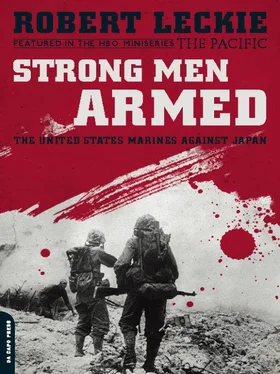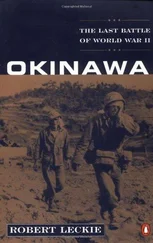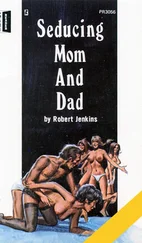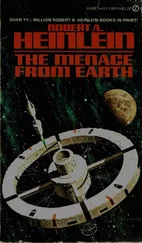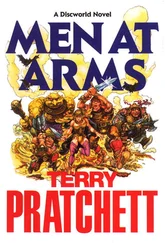Robert Leckie - Strong Men Armed
Здесь есть возможность читать онлайн «Robert Leckie - Strong Men Armed» весь текст электронной книги совершенно бесплатно (целиком полную версию без сокращений). В некоторых случаях можно слушать аудио, скачать через торрент в формате fb2 и присутствует краткое содержание. Город: Cambridge, Год выпуска: 2010, ISBN: 2010, Издательство: Da Capo Press, Жанр: nonf_military, на английском языке. Описание произведения, (предисловие) а так же отзывы посетителей доступны на портале библиотеки ЛибКат.
- Название:Strong Men Armed
- Автор:
- Издательство:Da Capo Press
- Жанр:
- Год:2010
- Город:Cambridge
- ISBN:978-0-786-74832-7
- Рейтинг книги:3 / 5. Голосов: 1
-
Избранное:Добавить в избранное
- Отзывы:
-
Ваша оценка:
- 60
- 1
- 2
- 3
- 4
- 5
Strong Men Armed: краткое содержание, описание и аннотация
Предлагаем к чтению аннотацию, описание, краткое содержание или предисловие (зависит от того, что написал сам автор книги «Strong Men Armed»). Если вы не нашли необходимую информацию о книге — напишите в комментариях, мы постараемся отыскать её.
Strong Men Armed — читать онлайн бесплатно полную книгу (весь текст) целиком
Ниже представлен текст книги, разбитый по страницам. Система сохранения места последней прочитанной страницы, позволяет с удобством читать онлайн бесплатно книгу «Strong Men Armed», без необходимости каждый раз заново искать на чём Вы остановились. Поставьте закладку, и сможете в любой момент перейти на страницу, на которой закончили чтение.
Интервал:
Закладка:
Part of his patrol drove straight ahead while a platoon swung to the right to get behind the Japanese. In a fight lasting nearly an hour, 31 of the Japanese were killed and three others escaped into the jungle. Three Marines were killed and three wounded.
It might have been put down as another jungle skirmish, except that the patrol was unusally large for the supposed remnant of laborers left on the island. Moreover it had been led by four officers of surprisingly high rank, the uniforms of the dead soldiers were new—and they had been laying communications wire when attacked.
Brush quickly stripped the dead of maps and documents and sent these back to the perimeter.
Marine intelligence officers were disturbed by the maps. They were accurate, with all of the weak points along the Tenaru carefully marked.
Lieutenant Colonel Al Pollock pulled some of the machine-gunners of his Second Battalion, First, off the beach line and sent them south along the Tenaru to extend his right flank. On the left where a sandspit kept the green sluggish Tenaru from reaching the sea, Pollock had placed his heaviest concentration—machine guns, riflemen and a 37-millimeter antitank gun, all dug in behind a single strand of barbed wire running across the sandbar.
The sandpit was as good as a bridge across the river. Pollock placed outposts beyond it, west of it, in the coconut grove across the river.
Night fell swiftly, as it does in the jungle. A few stray shafts of light seemed to linger, as though trapped between jungle floor and jungle roof, and then it was black and silent except for the stirring of those creeping, crawling things that move by night. Men crouched along the Tenaru peered at the narrow dark river gleaming wickedly in the faint starlight and felt all those atavistic fears flowing formlessly around their hearts. The crocodiles were out, their noiseless downstream swimming marked by the gradually widening V of their wakes.
Down at the sandbar there was movement opposite the outposts. A marine fired at the sound.
“No, no! Me Vouza. Me Sergeant-Major Vouza.”
A short powerful figure stagged out of the darkness. Blood streamed from his naked chest, from his throat. He was a fuzzy-haired Melanesian, he was Sergeant-Major Vouza of the Solomons Island Police and the Japanese had caught and tortured him. He was taken to Pollock’s command post, and there, with blood still dripping from his wounds, he began to speak.
“I was caughted by the Japs and one of the Jap naval officer questioned me but I was refuse to answer. And I was bayoneted by a long sword twice on my chest, through my throat, and cutted by side of my tongue. And I was got up from the enemies and walked through the American front line.”
“How many Japs?” Pollock asked sharply.
“Maybe 250, maybe 500.”
Pollock had heard enough. He called Division to come for Vouza. He glanced at his watch to mark the time at eighteen minutes past one in the morning, and at that moment a green flare rose from the coconut grove, a Marine sentry fired a shot —and the charge of the Ichikis began.
They came flowing across the sandspit, sprinting, hurling grenades, howling. They came blundering into that single strand of barbed wire, and there they milled about in a jabbering frenzy. They hacked wildly at the wire with bayonets, they tried to hurdle it, and they slung long thin lengths of explosive-packed pipe under it in hopes of blowing gaps in it.
Then the Marines opened fire, the flare-light faded and the re-enveloping night seemed to reel with a thousand scarlet flashes. Machine guns chattered and shook. Rifles cracked. Grenades whizzed and boomed. Fat red tracers sped out in curving arcs and vanished. Orange puffs spat from the mouth of the antitank gun. Howitzers bayed in the rear distance and their whistling shells crashed and flashed among the coconuts where mortar missiles had already described their humming loops and were falling with that dull crrrunch that tears and kills.
Private Johnny Rivers unclamped his heavy machine gun to spray a hosing fire. Across the river a Japanese machine-gun section jumped into an abandoned amtrack to set up a crossfire on Rivers’ pit. Their bullets crept up the riverbank, ate their way down the water-jacket of Rivers’ gun and found his heart. Rivers froze on the trigger. Dead, he fired 200 more rounds. Private Al Schmidt jumped on the gun, fed it another belt, resumed the fire. A grenade sailed into the pit. It exploded. It knocked out the gun. It blinded Al Schmidt. He lay in the darkness while the battle swirled around him.
Downstream the barrel of the antitank gun glowed red in the dark. It was firing point-blank at the charging foe, spewing a hail of cannister shot that sometimes struck them down in squad groups. Another grenade somersaulted through the night. It fell hissing into the antitank dugout and filled it with roaring light and death. Riflemen jumped into the dugout and the 37 glowed red again.
The Ichiki charge rose in fury. Squad after squad, platoon after platoon, burst from the covering darkness of the coconut grove to dash against the line. They broke it. They came in on holes and gunpits, running low with bayoneted rifles outthrust for the kill. At a gap in the leftward wire, three Japanese rushed for big Corporal Dean Wilson in his foxhole.
Wilson swung his BAR toward them. It jammed. The Japanese rushed onward, screaming “Marine you die!” One of them drove downward for the thrust. Wilson seized his machete and slashed. The man sank to the ground, his entrails slipping through his clutching fingers. The others slowed. Wilson leaped from his hole and attacked, hacking them to death with his thick-bladed knife.
There was a Japanese inside Corporal Johnny Shea’s hole. His bayonet was into Shea’s leg, out again, in again—out and slashing upward. Shea kicked with his right foot, slamming the Japanese against the foxhole side while he yanked desperately at the bolt of his jammed tommy gun. The bolt snicked free and Shea shot his assailant to death.
There were hurrying squat shapes swarming around the foxhole where Lieutenant McLanahan lay with wounds in both arms, in his legs, in his buttocks—loading rifles and clearing the jammed weapons of those men who could still fire.
There were tall shapes mingling with the short ones, figures that closed, merged, became as one grotesquely whirling hybrid of struggling limbs, for now the battle had become that rarity of modern war, the close-in fight of clubbed rifles and thrusting blades, of fists and knees and gouging thumbs. Now there were more tall shapes than short ones, for Pollock had thrown in a reserve platoon, and the guttural cries of “Banzai!” were growing fainter beneath the wild keening of the battle, the crackling of rifles, the hammering of machine guns, the gargling of the automatics, and the jumping wham of the 37.
The Ichikis were stumbling now over heaps of slain comrades strewn along the sandbar. They were themselves slumping into loose ungainly death, for the Marine fire had been multiplied from upriver where the guns had been swung seaward and trained on the sandspit. The last of the Ichikis were trapped. Marine mortars had drawn a curtain of fire behind them. Bullets ahead, shell-bursts behind—forward or backward was to die.
Some chose the river, where American bullets still sought and found them and where crocodiles found them in the morning. Some chose to run the gantlet of guns along the shore, peeling off to their right at the barbed wire, dashing through the surf only to be dropped where the incoming tide would roll their bodies and cover them with sand. Others chose the sea. They plunged into the water. They tried to swim back to the east, but it was now dawn and their bobbing heads were visible targets for those Marine riflemen who had left their pits and had thrown themselves flat to fire from the prone position.
Читать дальшеИнтервал:
Закладка:
Похожие книги на «Strong Men Armed»
Представляем Вашему вниманию похожие книги на «Strong Men Armed» списком для выбора. Мы отобрали схожую по названию и смыслу литературу в надежде предоставить читателям больше вариантов отыскать новые, интересные, ещё непрочитанные произведения.
Обсуждение, отзывы о книге «Strong Men Armed» и просто собственные мнения читателей. Оставьте ваши комментарии, напишите, что Вы думаете о произведении, его смысле или главных героях. Укажите что конкретно понравилось, а что нет, и почему Вы так считаете.
